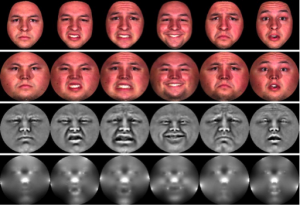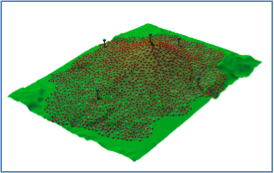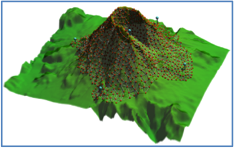Wei Zeng
Research Profile
Dr. Wei Zeng’s research centers on applying modern geometry to solve real problems in engineering and biomedicine, especially on geometric analysis and its applications.
Recently, she has been working on the following projects related to cyber security:
- Biometrics in Cyber Security. Biometrics is the science and technology of measuring and analyzing biological data. In information technology, biometrics refers to technologies that measure
 and analyze human body characteristics, such as DNA, fingerprints, eye retinas and irises, facial patterns, voice patterns, and hand measurements, for authentication purposes. The incorporation of biometrics into cyber space will greatly enhance the information security. The pipeline of biometric verification (bio-data acquisition, preprocessing, shape representation, feature extraction, comparison, and recognition, and shape evolution analysis) and its combination with cyberspace applications (e.g., user recognition and localization, information assurance) will be explored. The novel algorithms on imaging and shape analysis will be invented.
and analyze human body characteristics, such as DNA, fingerprints, eye retinas and irises, facial patterns, voice patterns, and hand measurements, for authentication purposes. The incorporation of biometrics into cyber space will greatly enhance the information security. The pipeline of biometric verification (bio-data acquisition, preprocessing, shape representation, feature extraction, comparison, and recognition, and shape evolution analysis) and its combination with cyberspace applications (e.g., user recognition and localization, information assurance) will be explored. The novel algorithms on imaging and shape analysis will be invented. - Geometric Analysis in Networks. The graphical network data are ubiquitous today, such as wireless sensor network, social network, Internet, power grid, and any other wired or virtual

 networks in different industries. Usually these networks are with a very large scale, containing a huge amount of nodes and complicated topology (highly non-planar). More sophisticated tools from modern geometry can be applied to benefit the main applications in networking, such as delivery guaranteed routing, load balancing, efficient information distribution, network dynamics analysis, sensor localization, deployment, and so on. Ricci flow theory is fundamental in geometric analysis, can handle arbitrary surfaces and graphs, and offers a powerful and practical tool towards the above real applications.
networks in different industries. Usually these networks are with a very large scale, containing a huge amount of nodes and complicated topology (highly non-planar). More sophisticated tools from modern geometry can be applied to benefit the main applications in networking, such as delivery guaranteed routing, load balancing, efficient information distribution, network dynamics analysis, sensor localization, deployment, and so on. Ricci flow theory is fundamental in geometric analysis, can handle arbitrary surfaces and graphs, and offers a powerful and practical tool towards the above real applications.
Previous Accomplishments
- Awards
- The Gaheon Award for the Best Paper from Volume 9, Year 2009 of the International Journal of CAD/CAM (IJCC), Korea, 2010
- The NSF Travel Grants for Graduates/Postdocs for The 29th Conference on Computer Communications (IEEE INFOCOM’10) and The 51th Annual Symposium on Foundations of Computer Science (FOCS’10).
- Collaboration
- Microsoft Research, Redmond
- Microsoft Research Asia, Beijing, China
- Tsinghua University, China
- University of California, Los Angeles
- The Hong Kong University of Science and Technology
- Stony Brook University
Relevant Publications
Biometrics Related:
- W. Zeng, H. Li, L. Chen, J. Morvan and X. Gu. An Automatic 3D Expression Recognition Framework based on Sparse Representation of Conformal Images. The 10th IEEE International Conference on Face and Gesture Recognition (FG’13), Apr 22-26, 2013, Shanghai, China.
- W. Zeng, R. Shi, Y. Wang, S.-T. Yau and X. Gu. Teichmüller Shape Descriptor and Its Application to Alzheimer’s Disease Study. International Journal of Computer Vision (IJCV), to appear.
- W. Zeng, D. Samaras and X. Gu. Ricci Flow for 3D Shape Analysis. IEEE Transactions on Pattern Analysis and Machine Intelligence (IEEE TPAMI), 32(4): 662-677, 2010.
Network Related:
- S. Li, W. Zeng, D. Zhou, X. Gu and J. Gao. Compact Conformal Map for Greedy Routing in Wireless Mobile Sensor Networks. The 32th IEEE Conference on Computer Communications (INFOCOM’13), Apr 14-19, 2013, Turin, Italy.
- X. Ban, M. Goswami, W. Zeng, X. Gu and J. Gao. Topology Dependent Space Filling Curves for Sensor Networks and Applications. The 32th IEEE Conference on Computer Communications (INFOCOM’13), Apr 14-19, 2013, Turin, Italy.
- W. Zeng, R. Sarkar, F. Luo, X. Gu and J. Gao. Resilient Routing for Sensor Networks Using Hyperbolic Embedding of Universal Covering Space. The 29th IEEE Conference on Computer Communications (INFOCOM’10), Mar 15-19, 2010, San Diego, California, USA.